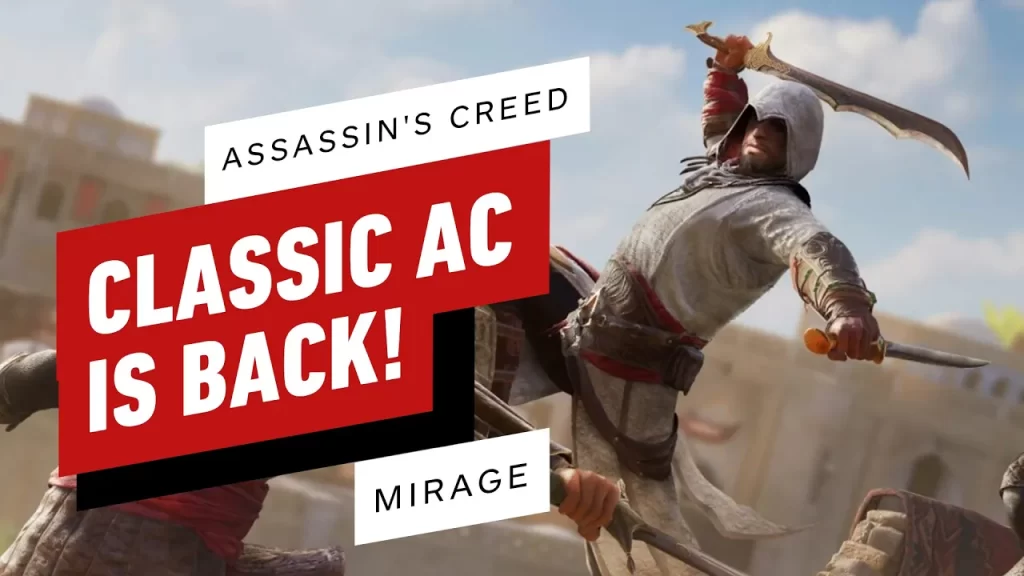Now, let’s delve into the gameplay mechanics of Assassin’s Creed Mirage. As previously mentioned, this game takes a step back from the massive open-world RPG approach of its predecessors. Instead, it embraces a more focused and traditional Assassin’s Creed gameplay style.
The core of Mirage centers around stealth. The stealth mechanics are straightforward, and while the guards may still be hopelessly oblivious at times, it manages to offer a satisfying experience for those familiar with the series. You’ll find yourself hiding in bushes, crouching and climbing, and using whistles to lure unsuspecting foes for a quiet takedown. The thrill of the chase and the satisfaction of executing a stealthy assassination remain at the heart of the game.
Mirage retains some classic Assassin’s Creed elements, such as blending into crowds or sitting on a bench to disappear from view. These interactions with the environment add depth to the stealth experience, making you feel like a true assassin in a historical setting.
Assassin’s Creed: Mirage Tools and Upgrades
As an assassin, you have access to a set of tools to aid you in your missions. These tools include throwing knives, a noisemaker, a powdered smoke bomb, and blow darts. While the toolset may seem limited, it serves its purpose well.
One interesting aspect is the tool upgrade system. You can enhance your tools by visiting assassin bureaus and spending collected resources. This three-tiered upgrade system allows you to customize your tools to suit your preferred playstyle. For example, you can choose to make your throwing knives deadlier or more stealthily efficient. These choices add depth to your arsenal and make each playthrough unique.
Skills and Progression
Mirage features a skill tree that offers meaningful choices for character progression. You can spend skill points in one of three branches to unlock various abilities and upgrades. These include skills like chain assassination, a stunning kick, increased carrying capacity, and more. The skill tree provides a sense of progression, and every skill you unlock feels worthwhile, contributing to your growth as an assassin.
Additionally, collecting resources plays a crucial role in the game. These resources are used not only for tool upgrades but also for enhancing your weapons and clothing with useful perks and stat upgrades. This resource management adds an extra layer of strategy to your gameplay.
Missions and Exploration
The missions in Mirage are notably open-ended. When approaching a mission, you have the freedom to choose your approach. You can use your bird to scout out enemies and locate secret entrances or exits. You might opt to complete side objectives to draw out key enemies or set up traps for a more creative approach. Alternatively, you can rely on your stealth skills to navigate through missions without alerting anyone.
Exploration is encouraged, as you’ll uncover hidden treasures and complete side objectives that reward you with the special tokens needed to enlist the help of various groups in the city. These tokens serve as a form of currency for assistance, be it starting a fight, creating a distraction, or lowering your notoriety.
Speaking of notoriety, the game features a notoriety system. Your actions in public or in front of enemies affect your notoriety level. The higher your notoriety, the more easily you’ll be recognized and pursued. To mitigate this, you can bribe a town speaker or remove wanted posters to reduce your notoriety. This system adds an element of consequence to your actions, reminiscent of earlier titles in the series.
Combat
While Mirage emphasizes stealth, it also features combat. The combat mechanics are relatively simple, offering basic attacks, heavy attacks, parrying, and dodging. However, compared to both earlier and later Assassin’s Creed titles, the combat here feels somewhat lacking in complexity.
The combat system might be a polarizing aspect for players. Some may appreciate its simplicity, while others might find it less engaging, especially in comparison to more intricate combat systems in other games. It’s essential to watch gameplay videos to determine if the combat aligns with your preferences.
Presentation and Story
As for the presentation and story, Mirage delivers a mixed bag. The quality of cutscenes can vary, with some lacking the excitement factor. Character animations can occasionally appear awkward. Nevertheless, the voice acting is generally commendable, and the availability of multiple language options is a nice touch.
The story itself, while not overly epic or memorable, holds some intrigue, especially if you’ve already completed Valhalla. There’s a sense of depth in uncovering Bazem’s character and exploring the connections within the Assassin’s Creed universe. The pacing keeps you engaged, as you’re always moving forward to the next mission or discovery.
Conclusion
In conclusion, Assassin’s Creed Mirage offers a return to the franchise’s roots with a more traditional Assassin’s Creed experience. It strikes a balance between classic gameplay elements and some elements of the newer titles. While it may not cater to everyone’s preferences, it provides a simpler, historical setting that fans of the original games may appreciate.
My personal take on Mirage is that it represents a step in the right direction for the series, even though it doesn’t fully recapture the magic of earlier titles. As with any game, individual opinions will vary, so I encourage you to explore more gameplay videos and reviews to determine if Mirage aligns with your expectations.
Feel free to share your thoughts on Assassin’s Creed Mirage in the comments below. Your perspective and experiences are valuable to the gaming community. And if you found this review helpful, please consider liking the video and subscribing for more content.

